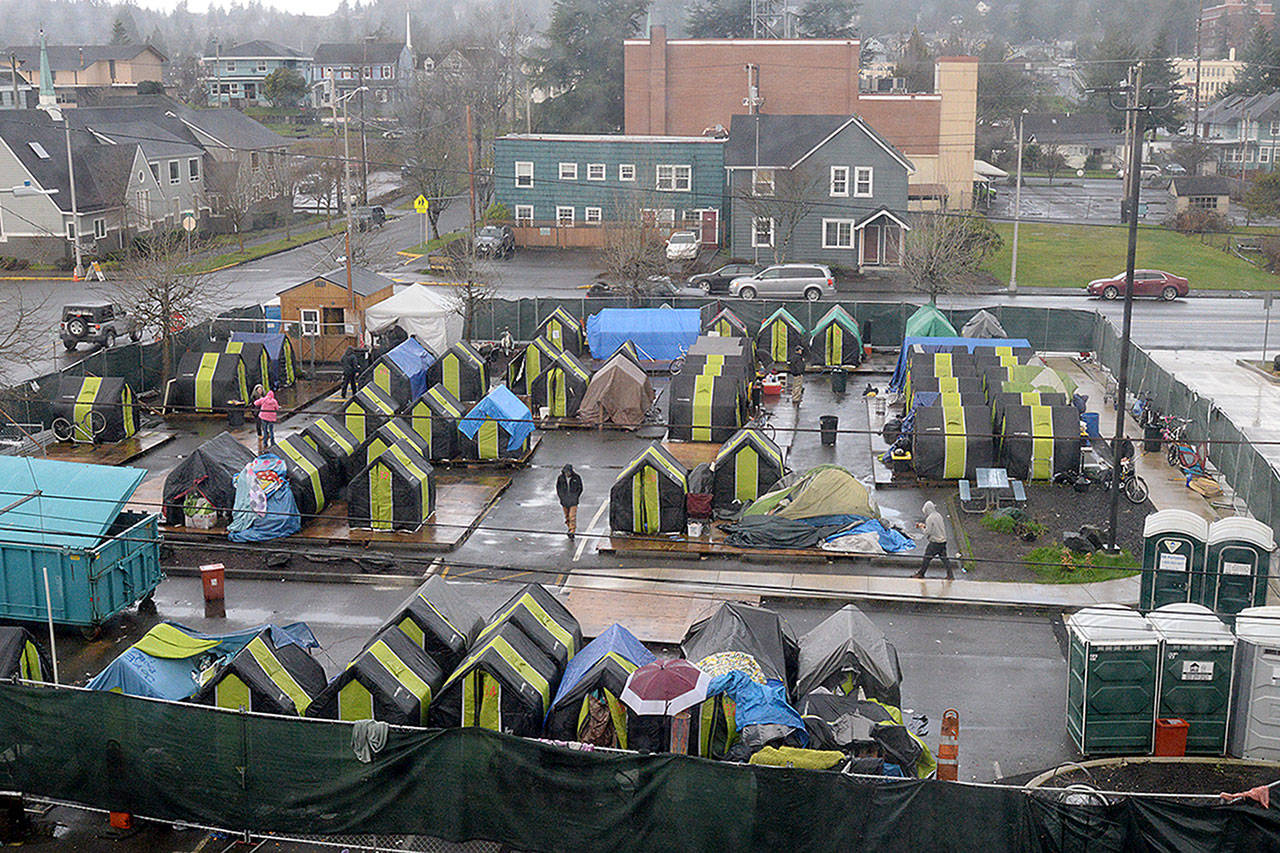The City of Aberdeen is asking Grays Harbor County government to split the monthly cost of operating the temporary homeless camp behind Aberdeen City Hall.
It costs the city about $28,000 per month and the city is asking the county for $13,800 per month plus a one-time expense of $45,000 to cover half of the cost of relocating the camp to a different site later this year.
The funds would help the city continue to provide temporary and emergency shelter for unsheltered adults until the county is able to build and staff a shelter in accordance with its Five Year Plan, said a letter from the council’s Ad Hoc Committee on Homeless Response signed by Mayor Pete Schave and three council members — Tawni Andrews, Karen Rowe and Dee Anne Shaw.
“We hope the Board of Commissioners recognizes that the cost of the (homeless camp) is too high for the citizens of Aberdeen to undertake alone,” the letter reads.
Over 85% of the camp’s monthly operating costs pay for 24-hour staffing and security, according to the city’s letter. The city’s 2020 cost projection includes $89,000 for relocating the camp to another site.
One site being considered is the property the city purchased last year between South Michigan and Alder Streets immediately north of the railroad tracks. City Council voted against establishing a longer-term homeless camp at the 421 S. Michigan St. property in October. The council will need to take action before March 15 to either extend the permit for the current camp or move the camp to a new location.
City staff toured nine locations in May 2019 and identified those that were top ranking, but there are no good choices about where to put a homeless camp, according to Shaw, the city council president.
“Whatever is decided, it’s going to be the least worst choice,” Shaw said.
Every potential site in the city has neighbors, is farther from services than the current location behind City Hall, and the city can only consider properties that it already owns or that are offered for sale, she added.
“I think that what the council does next is going to depend on whether the county participates with us,” Shaw said.
If the county agrees to help financially, it’s likely that the council will vote to extend the permit of the current camp before it expires on March 15, she explained.
“I don’t know what the council will do if it continues to be a 100% burden on the taxpayers of the City of Aberdeen. It’s just not sustainable,” she said.
“I’m really hopeful that going forward there’s more understanding that Aberdeen is the hub,” she said.
People are frustrated with the city because they see that the chronically unsheltered need these services, but the city isn’t equipped to provide them. The city needs to team up with service providers to get people the help they need, she said.
Camp participants have to sign up with CCAP before entry, so CCAP has access to them to connect them with the services that they need — drug treatment, mental health services and re-housing people, she said.
Mayor Pete Schave said at a Jan. 29 workshop on the homeless issue that he thinks as many as one-third of the homeless would move on if the camp is closed.
Some worry that if there’s no sanctioned camp, it will lead to people sleeping on sidewalks in front of businesses and drive more people to unsanctioned and more squalid camps such as the now closed river camp.
“Aberdeen without a camp is not a place I want to go back to. We already know what happens in Aberdeen without a camp. It was horrible for our business community,” said Shaw.
There’s been a lot of talk, a lot of public comment, but to my knowledge this is the first time (the county) has been formally asked to do something,” she said.
“My goal and I think the council’s goal, is not to fan the flames about what’s gone on in the past, it’s to say let’s all come together and really roll up our sleeves and figure out how we can mitigate the impact of this on the city,” she said.



